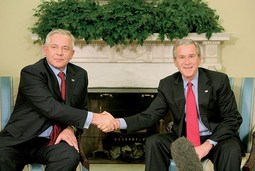Published in Nacional number 595, 2007-04-10
POLITICAL REPORT
Opposition sabotaging Croatia’s entry into NATO in 2009
At next year’s NATO Summit, Croatia will receive an invitation to join; however, the opposition is against entry into the Alliance without a referendum
 WASHINGTON MEETING During Premier Sanader’s 2006 visit to US President George W. Bush, great progress was made in bringing Croatia close to NATO It is now almost certain that in spring of 2008, Croatia will receive an invitation to join NATO, though this international success has caused a serious rift on the Croatian political scene. The leading opposition party SDP has announced that it will insist on a referendum for accession to the military alliance, thereby definitely countering Ivo Sanader’s government and President Stipe Mesic, who believe that a parliamentary decision is sufficient on this issue. Considering that other parties, from HSS and HSLS to HNS and HSP, agree on the need for a referendum, and given the high degree of public uncertainty on joining NATO, it is becoming increasingly unclear as to whether Croatia will indeed accept the invitation to join.
WASHINGTON MEETING During Premier Sanader’s 2006 visit to US President George W. Bush, great progress was made in bringing Croatia close to NATO It is now almost certain that in spring of 2008, Croatia will receive an invitation to join NATO, though this international success has caused a serious rift on the Croatian political scene. The leading opposition party SDP has announced that it will insist on a referendum for accession to the military alliance, thereby definitely countering Ivo Sanader’s government and President Stipe Mesic, who believe that a parliamentary decision is sufficient on this issue. Considering that other parties, from HSS and HSLS to HNS and HSP, agree on the need for a referendum, and given the high degree of public uncertainty on joining NATO, it is becoming increasingly unclear as to whether Croatia will indeed accept the invitation to join.
From discussions with the leading representatives of the government and opposition, it would appear that the two sides are diametrically opposed on the issue. The paradox, however, is that all parties publicly welcome membership in NATO, while SDP has opened the issue of a compulsory referendum. While Ivo Sanader assessed even an advisory referendum to be unnecessary in the parliament, the Social Democrats believe that this would be violating the Constitution. HDZ is advocating the position by which entry into NATO is not entry into a new legal statehood community, in which case the Constitution requires a referendum. For the most part, they are leaning towards this as public opinion polls show that more than half of Croats are against the idea. Even the newest polls, which are more positive for the Sanader government than previous polls, show that only 43% of all citizens are in support of joining NATO, which is up 4% from the end of 2006. Despite this slight increase, this is still insufficient support, and in a recent discussion with members of the Croatian administration, public support is what the NATO officials demanded.
The situation is further complicated by SDP’s position that they will not accept a solution that is not preceded by a referendum. Zoran Milanovic states that the party supports accession, but only if it receives the support of a referendum. In Ivica Racan’s former government, Milanovic led the Interdepartmental Group for NATO and led the delegation at numerous meetings with NATO representatives as the national co-ordinator. “A referendum is not a legal, but a political issue, regardless of what Sanader’s government says. Bringing the discussion down to the legal dimension is sophism, as the Constitution does not call for a referendum, but on such an important issue, the expression of will of the citizens is important. Furthermore, when Croatia joins NATO, this will not simply be technical issues, considering that according to Article 5 of the Washington Accord from 1994, it states that like all other members, in the event of an attack against a NATO member, we will have to engage our army in order to defend that member. That is why SDP will not accept entry into NATO without a referendum. I can say, here and now, that I myself will circle YES on the referendum paper,” said Milanovic.
He supports his personal support for the issue with the argument that by entering into NATO, Croatia would be increasing its own security, particularly since this is a group of liberal-democratic states with a high degree of protection for human rights and developed economies. Milanovic is convinced that by insisting on a referendum, SDP is not endangering the issue, as the majority of Croatian citizens are not a priori against accession. Instead, he puts the blame on the ruling party.
SDP’s insistence on a referendum has aroused quite a bit of rage within the government ranks. On Saturday, 7 April, a close associate of Sanader commented for Nacional that SDP is trying to politicize an issue the government is trying to find a consensus for. Sanader’s team believes that the accession talks are going very well, and that entry into NATO is a strategic goal of this administration. Briefly put, the HDZ government believes that with membership in NATO, Croatia will strengthen its position in the region, where the future of Kosovo is still uncertain and political tensions are growing in Serbia. In such an unstable environment, the idea of a referendum that could fail is an irresponsible move, claims Nacional’s source.
 MATE GRANIC, former Foreign Minister, believes that the government should hire a PR agency to win over public support for entry into NATO “Due to the upcoming parliamentary elections, SDP is politicizing the issue, even though they know that a referendum is not necessary. Entry into NATO does not mean handing over a part of our sovereignty; this is like having a referendum to decide on whether Croatia should join the UN or the Council of Europe. At the end of 2006, Ivica Racan met with Ivo Sanader and agreed that SDP would support constitutional changes with respect to the referendum. According to the current provisions, a referendum is valid if 50% + 1 of the registered voters vote positively. The SDP president agreed to make changes so that a majority vote would be a positive vote by 50% + 1 of the voters who actually come out to vote. Unfortunately, before we could finalize the agreement, Racan fell ill and now his party associates are doing things completely wrong,” claims Sanader’s associate.
MATE GRANIC, former Foreign Minister, believes that the government should hire a PR agency to win over public support for entry into NATO “Due to the upcoming parliamentary elections, SDP is politicizing the issue, even though they know that a referendum is not necessary. Entry into NATO does not mean handing over a part of our sovereignty; this is like having a referendum to decide on whether Croatia should join the UN or the Council of Europe. At the end of 2006, Ivica Racan met with Ivo Sanader and agreed that SDP would support constitutional changes with respect to the referendum. According to the current provisions, a referendum is valid if 50% + 1 of the registered voters vote positively. The SDP president agreed to make changes so that a majority vote would be a positive vote by 50% + 1 of the voters who actually come out to vote. Unfortunately, before we could finalize the agreement, Racan fell ill and now his party associates are doing things completely wrong,” claims Sanader’s associate.
However, SDP denies there ever was an agreement between Racan and Sanader. “This is not true, as we regularly spoke with Racan on NATO related issues. He never agreed to constitutional changes on a NATO referendum with Sanader, but instead they had some initial talks on the future referendum for the day when Croatian is to enter the European Union. In order words, anyone who claims that Racan agreed with Sanader on this issue is lying,” responded SDP.
The good thing is that in the talks to date, Croatia has successfully completed all five chapters of the Membership Action Plan (MAP). With the exception of the reorganisation of the Armed Forces, NATO is satisfied with the state of human rights, the general political and economic criteria and civil control of the military. From that perspective, Croatia has met all the set criteria, which was confirmed at the recent NATO Summit in Riga.
Regardless of whether a referendum will be held or not, at the next NATO Summit, to be held in either Bucharest or Lisbon in 2008, Croatia will receive an invitation. This will be followed by the process of ratification in the member states, which could last from 6 to 12 months. That means that Croatia could become a full-fledged member in 2009, likely at the official ceremony commemorating the 60th anniversary of the establishment of the Alliance.
Now comes the tough task of obtaining public support. Mate Granic, former Foreign Minister, believes that the government should hire a PR agency to take on this task and he claims that the entire operation should be completely non-partisan. Like the majority of Croatian politicians, Granic holds that entry into NATO brings with it a number of positive effects, claiming, that “never in the 58 years of its existence has a NATO state even been attack, nor have any of the member states gone to war, though some, like Turkey and Greece, have had many problems”. Furthermore, the figures support that membership would bring a series of positive impacts for Croatia.
The direct costs of NATO membership for the Croatian budget would be about $6 million per year, or less than 1% of Croatia’s annual military budget. The joint NATO budget is divided into civil and military budgets, as well as a fund intended for secure investment programmes. According to all studies conducted to date by the US Department of Defence, the US Congress and the RAND corporation, Croatia will never have such guaranteed security for such little money, while foreign investments in the Croatian economy will grow by at least twenty per cent.
'HDZ is not convincing'
Zoran Milanovic from SDP blames HDZ for the poor public support for entry into NATO. “The story about our accession has been going on for a long time. Incorrect statements about NATO’s role in Iraq have been placed in the media, and it is obvious that the citizens are calculating. But if the majority of Croats are against NATO, then neither SDP nor HDZ could win the elections. The problem is that HDZ is passive and not convincing, and this is why the public is reacting this way,” warns Milanovic.
Related articles
Sanader’s eight fear SDP — Won’t bring down Government
Despite forecasts that he would, former Croatian Prime Minister Ivo Sanader, who recently took his seat in Parliament, will not work from the house… Više
Latest news
-
28.10.2010. / 14:15
'A profitable INA is in everyone's interest'
-
28.10.2010. / 09:38
Sanader’s eight fear SDP — Won’t bring down Government
-
21.10.2010. / 15:02
Interior Ministry turned a blind eye on Pukanic assassination
-
20.10.2010. / 09:34
Barisic could bankrupt HDZ




